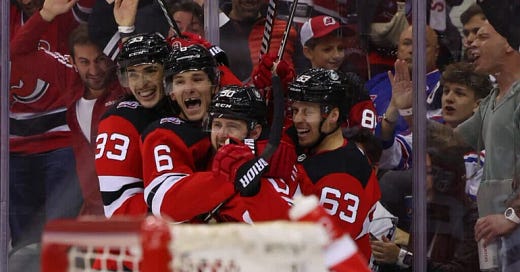Rangers’ Expected Advantages Muted By Devils In Game 7
In a series as evenly-matched as the Devils/Rangers Eastern Conference quarterfinals had been for the first six contests, I figured Monday night’s winner-take-all Game 7 at Prudential Center would be decided by the usual suspects I wrote about in my series preview—goaltending, special teams, and experience. I also figured that the Rangers would hold heavy advantages in all three areas.
In this back-and-forth series, with New Jersey overcoming losses in the first two games at home before winning three in a row and then dropping a 5-2 decision in Saturday’s Game 6, New York appeared to have the momentum as well.
The Devils, though, would not be denied. Their 4-0 rout secured their first postseason series victory since 2012 and sent them into the second round against the Metropolitan Division champion Hurricanes, with Game 1 set for Wednesday in Carolina.
Those supposed advantages? New Jersey flipped them on its side. The Devils were able to get to their speed game because; A) While Rangers goalie Igor Shesterkin was again magnificent, his counterpart, Devils rookie Akira Schmid, was perfect, stopping all 31 shots; B) The Devils, who before the game vowed to stay out of the penalty box, put themselves down a man four times in the first two periods, but not only did the penalty killers keep New York’s very dangerous power play off the board, they contributed a shorthanded goal of their own, and; C) Whereas many of the Rangers who went through these types of desperate wars before had subpar outings, it was the few New Jersey veterans who made the game-changing plays.
It all started with Schmid, who rebounded from Saturday’s rough performance to record his second shutout of the series in the five games he played after replacing regular season No. 1 Vitek Vanecek for the start of Game 3. Considering that it looked like the Rangers had solved Schmid, going back to him for such a game with no margin for error wasn’t guaranteed.
But Devils Head Coach Lindy Ruff stuck with the Swiss youngster and was rewarded with a masterful bounce back game. You could tell that the Rangers thought they could keep beating Schmid up high, but the pucks that dropped out of his glove in Game 6 stuck on Monday night. While you can’t compare the volume of chances Shesterkin faced to what Schmid saw (NaturalStatTrick.com had the Devils up, 22-5 on high danger scoring chances), New York had opportunities when the game was tight in the first two periods, only to be stoned by Schmid. Rangers forwards like Mika Zibanejad and Vladimir Tarasenko had pucks on their sticks in prime shooting positions, especially on the power play, but they could not convert those chances.
In their three victories during the series, the Rangers went 5-for-14 on their power play; in the four losses, 0-for-14. Two of their four failed opportunities on Monday were abbreviated. On the last one, seven seconds after defenseman K’Andre Miller stepped out of the box to put New York on a 5-on-4, it was the Devils who struck twine.
Devils wing Ondrej Palat, who I roasted for a brutal Game 6 performance and had played a total of 5:31 on the penalty kill all season, made the most tenacious and crucial play of the series, outworking Rangers stars Adam Fox and Chris Kreider for a loose puck along the left wing boards before splitting the pair and then lifting a pass over the sliding Zibanejad to a cutting Michael McLeod in the slot. McLeod faked out Shesterkin with a deke to the backhand as if he were a righthanded Jack Hughes and slid the puck into the net for the all-important first goal of the game. McLeod, of course, is anything but Hughes, as it was his first goal since January 4, spanning 42 regular season games plus the first six games of the series.
Palat, a two-time Stanley Cup champions while with Tampa Bay, was one of several veterans Devils General Manager Tom Fitzgerald acquired last offseason to hasten the development of his young core. Of the 23 Devils who participated in the series, only nine had more than five games of prior NHL playoff experience. For eight players, this was their first series ever (forward Jesper Bratt, who sealed the deal with an empty netter, dressed for one game the last time New Jersey qualified back in 2018.)
Two other vets, defenseman John Marino and wing Tomas Tatar, teamed up on a second period rush, with Tatar getting the goal to put New Jersey ahead, 2-0, in the second period, and then Erik Haula, who had 61 career playoff games under his belt before last summer’s trade with Boston in exchange for Pavel Zacha, finished off another transition play with a one-timer off a terrific feed from Hughes with 5:33 remaining in the third period.
Where were the Rangers grizzled vets on Monday? Beats me, for the only player with an expected goals for percentage over 50%, per NST, was 21-year old forward Alexis Lafrenière. New Jersey’s puck decisions were on point, blunting New York’s forecheck. In addition, as Rangers MSG Network studio host Steve Valiquette astutely noted in the postgame show, the Devils’ speed wasn’t just evident in their puck movement up the ice; they backchecked with such determination that it seemed like whenever a Ranger appeared to break free past a Devils defender, another Devil would be on him within two seconds.
Goaltending, special teams, and veterans supporting the precocious core—that was the Devils’ winning formula to knock off their hated rivals. And it’s one they could conceivably continue into the second round to advance past Carolina too. This time, I won’t be fooled again.
Prediction: Devils in 6



